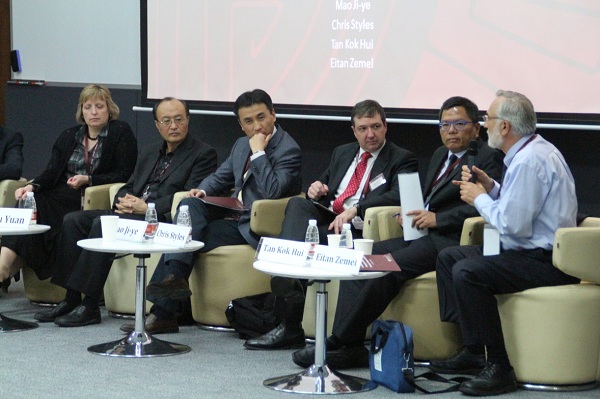BY SOPHIKO TSOTSKOLAURI 14', HICHAM LEFNAOUI 14'
The Global Dean’s Forum at the Peking University HSBC Business School on the Peking University Graduate School Shenzhen campus gathered international educators and domestic business leaders to discuss subjects related to education and business globalization. One of the main topics was, “The Global Mindset, Local Impact: How can Chinese companies become more globally competitive?”

During the Forum, it was generally agreed that a global mindset is the openness to and consciousness of diversity across cultures and markets with a tendency and aptitude to see common patterns across countries and markets. Employees with a global mindset regard educational and geographical diversity as opportunities to exploit and are prepared to adopt successful practices and good ideas wherever they come from.
Participants discussed how today, Chinese companies have evolved and a few of them have tried to venture in the global landscape. Others, to follow the path of Internet marketer Alibaba, have to embrace change, as the technological revolution is making the “global mindset” a prerequisite to becoming “global.” Simultaneously, everything starts in the classroom, where students, future leaders of tomorrow, have to shape their mind to see the world as an interconnected village.
Technology has evolved rapidly, transforming societies as well as educational systems. Costs have been reduced and educational resources have become more accessible and open to all communities. Moreover, interaction between professional training and learning in educational settings has created new experiences as well as many challenges.
The “Global Mindset” session attempted to address these issues, especially in the Chinese context, presenting an overview of globalized education and economy, as well as the best ways to develop and transform higher business education for a positive impact on global and Chinese companies.
Globalization is a complex phenomenon, encompassing cultural, economic, and social aspects. It is the result of interconnections between nations, organizations and individuals. It is also the increased movement of goods, services, labor, technology and capital. According to Stephanie Lenway, Dean of Opus Business School at the University of St. Thomas, “Globalization is a versatile process of technical changes.” She added that “it is a process of reducing barriers between nations that essentially results in increasing interconnections and economic interdependencies.”
Martin Binks, Dean and Professor of Entrepreneurial Development at Nottingham University Business School, mentioned that “with its political, economic and cultural dimensions, globalization has penetrated education and influenced business school systems, as we are directed more towards a sustainable development framework. This new tendency has created a new set of challenges to education stakeholders, in particular, how educational measures guide curriculum decisions and develop rigorous pedagogy capable of solving identity, education and global thinking challenges.”
For Alison Davis-Blake, Professor of Business at the University of Michigan, “Education is a set of knowledge, skills and attitudes necessary for integration into a society.” In this respect, “the modern business school has to provide a full and global education encompassing subjects such as business, sociology, and psychology, as each of these disciplines has its own purpose. Being acquainted with all these subjects will create a social and intellectual integration process, in which individuals will embrace difference, change and the transmission of knowledge.”
Moreover, Mao Ji-Ye, Dean and Professor at Renmin University of China, sees that “globalization has put a lot of pressure on individuals, as only a few people recognize the limitations of educational approaches in some universities.” In his words, “education and training are paramount for universities and companies.” That way only "useful knowledge" is transmitted to satisfy the needs of the globalized world market. He also talked about the experience of students in his university and their success in building bridges towards a global mindset.
Hellmut Schütte, Dean and Vice president of China Europe International Business School, remarked that “the relationship between new educational policies and globalization has been and still is a major debate, in which new actors are getting involved every day. The development of educational policies and the legitimacy of the participation of governmental and nongovernmental actors have created dependence on educational policies and global stakeholders.”
Raising another important matter were Chris Styles, from the UNSW Business School in Australia and Tan Kok Hui, Associate Dean at the Nan yang Technology University. They talked about balancing positive education and global aspirations. In their view, companies have been pushing for a one-dimensional educational mindset. Business schools have to be aware of this point and have to be careful on how to deal with it, as professors have to select a variety of subjects.
Finally, discussing the 10 anniversary of PHBS, Professor Eaten Zexel, Associate Vice-Chancellor for Strategy and Dean of Business at NYU Shanghai, mentioned that he was very impressed with the educational revolution that PHBS has brought to the Shenzhen area. With an international faculty and students, PHBS is heading in the right direction, as it is striving to create a great educational environment and introduce the latest trends in its curriculum.
Overall, the Global Dean’s Forum was a great opportunity to meet the world at PHBS. The role of every business school is to bring professionals and students together for better and sustainable business development. Only the future will tell us the results of our actions, but it is today that we have to change, strive for a balance and learn to make the best of our opportunities.
In conclusion, a global mindset is the consciousness of diversity. To succeed in our globalized world, business schools have to create new approaches, students have to “think outside the box,” and companies have to be creative in their recruitment and vision. Educational and geographical diversity are assets to be used for the development of any business and company. All these elements combined can only create a positive outlook for the future.















